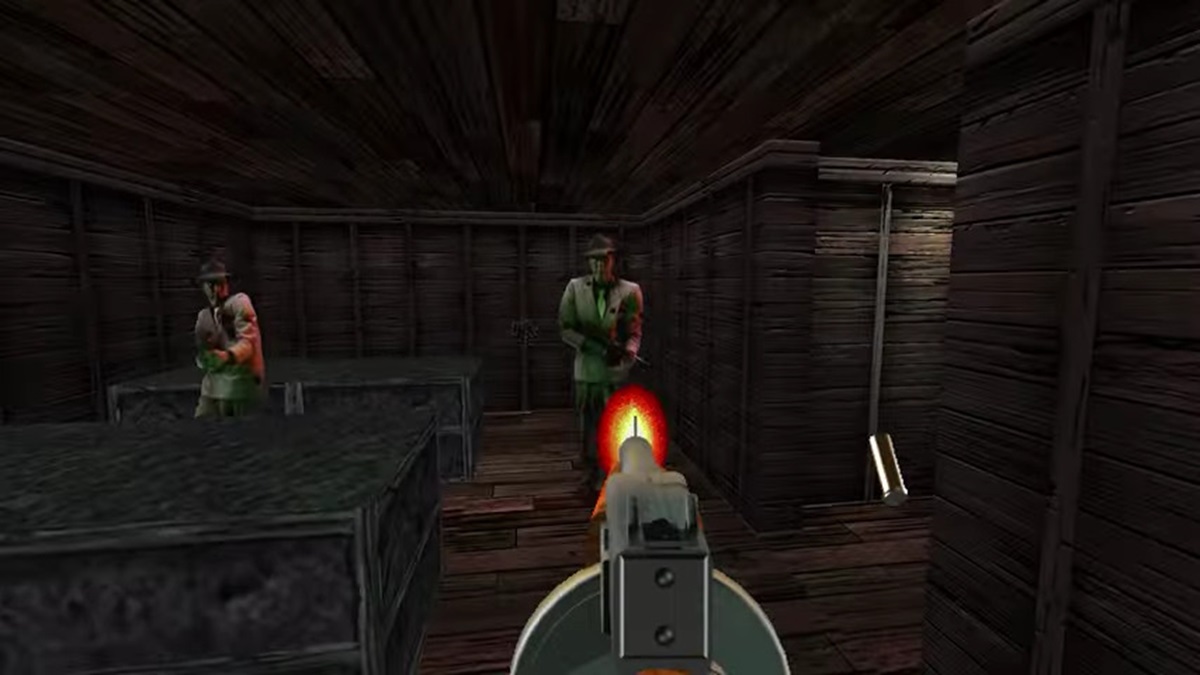Killing Time feels like such an obvious choice for Nightdive to tackle for a remaster. Initially released on the 3DO Interactive Multiplayer console in 1995, it received a port to PC in 1996. It’s an underappreciated gem that could use a polish and a second chance.
One thing that struck me in the recent trailer is just how much of an upgrade the new enemy sprites and textures look. Their remaster of Star Wars: Dark Forces was already an impressive touch-up, but the assets in Killing Time struck me as something that would be more difficult to really improve. Many of the enemies are digitized actors – pictures of people in costume. Others are 3D models turned into 2D sprites. How do you improve these without losing the feel of the originals?
Nightdive artist Albert Marin Garau sent me some details on the magic. Prepare to learn.

“We had access to old backup CDs that contained the original photographs they took to the real-life actors for the 3DO version of the game, and also higher resolution renders of other non-human enemies,” Albert told me.
The important thing to note is that the PC version of Killing Time wasn’t a direct port. The map was expanded and changed, and all the enemies had different sprites. These new enemy appearances weren’t always better. They were often just different. Notably, they removed the actors. This may look less hokey, but also changes the feel of the game.
Albert explained, “All this backup data was for the original 3DO version of the game, so we don’t have hi-res sprites of the enemies’ PC version.”
As I mentioned, the PC version added (and technically removed in a couple of cases) new enemies. So, without having high-resolution versions of the assets, Albert had to do things the hard way.
“Since some of the enemies are exclusive to the PC version (the Gardener, the Sexy Maid, the Tough Guy, and even the final boss, Tess, for example) we needed to do something to get a good quality balance between the backed and non-backed up assets. I modeled, rigged, skinned, and animated those exclusive PC enemies and rendered hi-res sprites that match the quality of the other hi-res assets,” he told me.
When the trailer flips from classic graphics to the remaster, the change in enemy design might seem a bit jarring. That’s not because Nightdive’s artists took liberties with the art style, it’s because of the change between PC and 3DO versions. “The low-res ones are the PC enemies, the hi-res are the 3DO enemies,” Albert explained.

As for the textures, which also have been upgraded for the remaster, the team once again had access to higher-quality versions from backup data… some of them, anyway.
“All backup data we have is for the 3DO version,” Albert explained. “Most textures used in the PC version came from the 3DO version, but around 25% of them are exclusive to PC. But thanks to the hand-drawn look nature of this game art style in the stage textures, it was possible to upscale and hand-draw all missing details with excellent results. All assets dimensions are 400% bigger than the original assets.”
Altogether, while Nightdive’s upgrades to the visuals seem pretty stark, a lot of effort was taken to ensure it’s true to the original experience. Despite sporting a gloss that feels more at home on modern displays, you still get a sense of the ‘90s sensibilities. It’s true to the studio’s attempts to ensure that their remasters are the new definitive versions, compiling all the original content, and changing as little as possible, while presenting them with modern comforts. After all, if you’re interested in playing Killing Time: Resurrected, it’s probably because you want to play Killing Time; not somebody’s weak facsimile.








